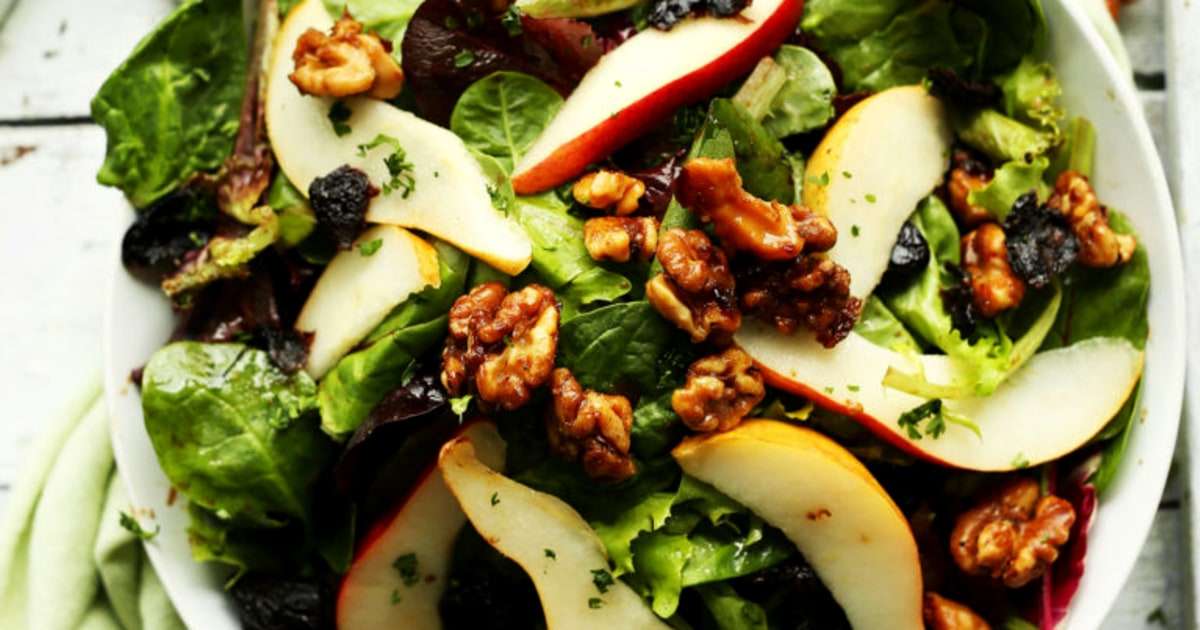You overslept and sprinted to work (in which time you dumped coffee down your shirt and realized you left your lunch at home). Luckily, you arrived at your 9 a.m. meeting just in time to have your to-do list loaded up by your boss. After battling a last-minute deadline and playing mediator for a disagreement between your siblings via text message, you manage to make it to the gym before finally heading home.
To say you’re ready to dive headfirst into a bag of potato chips (and perhaps wash them down with some Rocky Road) is an understatement.
But while your taste buds may tell you to enjoy a stress-fueled indulgence, these foods aren’t going to do anything for the symptoms that you’re attempting to soothe. You know: a crappy mood, low energy and unhealthy food cravings.
“The effects of chronic stress is mediated through the hormone cortisol,” says Dr. Barry Sears, leading authority on the dietary control of hormonal response, author and president of the non-profit, Inflammation Research Foundation. “Excess cortisol has adverse effects on anxiety and depression, as well as depressing the immune response. [It] can also cause damage in the hippocampus thus affecting memory. Cortisol increases insulin resistance, which has a negative effect on blood pressure. Insulin resistance also affects appetite by creating hyperinsulinemia that leads to low blood glucose…and increases deposition of excess fat in the adipose tissue causing weight gain.”
“When we feel stressed we seek foods that are going to comfort us immediately, but often times those foods lead to surges and crashes in hormones and blood sugar that increase our susceptibility to new stresses.”
“Dealing with high-stress days (especially on a consistent basis) can wreak havoc on your health in a variety of ways, but one of the greatest health detriments it poses is strain to your digestive system,” says Marra St. Clair, board Certified Nutritional Consultant, Holistic Health Coach and pair co-founder of Project Juice. “Since 80 percent of your immune system lives in your gut and 90 percent of your body’s serotonin (happiness chemical) is produced in the gastrointestinal tract, stress poses a real threat to your wellness and your happiness! Stress increases inflammation, can weaken your intestinal lining and decrease your healthy gut flora.”
You probably didn’t realize that your stressful day was having such a drastic effect on your body. But what does this have to do with what you eat for dinner?
The Food/Stress Connection
Stressful situations — whether it’s a tight deadline at work or sitting in traffic — set off a series of reactions in the body. Coritsol is the catalyst for those actions. As Dr. Sears mentioned its release has effects on our mood, immune system, blood pressure and appetite.
Cortisol gets a bad rap, but it actually serves an important purpose, released when we’re stressed to help drive-down inflammation in the body. But “if the initial levels of cortisol secreted from the adrenal glands is not sufficient for the inflammation at the molecular level, then more cortisol is secreted, which results in the effects mentioned above that we often associate with chronic stress,” explains Sears.
This is where our diet plays an important role: “The more of an anti-inflammatory diet we follow, the less need for excess cortisol to reduce chronic inflammation,” says Sears.
Plus, since stress may increase our desire to eat (when we aren’t actually hungry) and drives us to seek out “comfort foods” it’s important to keep stress-eating under control. Which many of us have a hard time doing: More than a third of the participants in a national survey conducted by NPR, the Robert Wood Johnson Foundation and the Harvard School of Public Health said they change their diets during stressful times.
“When we feel stressed we seek foods that are going to comfort us immediately, but often times those foods lead to surges and crashes in hormones and blood sugar that increase our susceptibility to new stresses,” David Ludwig, a professor of pediatrics and nutrition at Harvard University and a researcher at Boston Children’s Hospital told NPR.
Over time, constantly elevated stress levels can lead to weight gain. A meta-analysis conducted by Yale University School of Medicine hypothesized that hyper-palatable foods (read: chips, ice cream) may serve as “comfort food” that act as a form of self-medication to dispel unwanted distress.
“Repeated bouts of minor daily stressors that keep the stress system in a chronically activated state may alter brain reward/motivation pathways involved in wanting and seeking hyperpalatable foods and induce metabolic changes that promote weight and body fat mass,” the authors wrote.
That’s why having a few go-to recipes to whip up when you get home after a super-stressful day may be the key to preventing stress from showing up on your waistline.
5 Stress-Busting Dinner Recipes
So Doritos and a pint of Ben and Jerry’s aren’t going to cut it. But which foods should we be reaching for to help counteract the effects of stress on the body? The last thing we want to do after a long, hectic day is slave over the hot stove. That’s why we’re keeping these recipes in our stress-busting arsenal, to throw together when the cortisol spikes.

Salmon Burgers
Laughing Spatula
Grilled Salmon Burgers with Avocado Salsa
“The best nutrient to reduce inflammation is omega-3 fatty acids. They are not only anti-inflammatory at low concentrations, but also provide resolution of inflammation at higher concentrations,” says Dr. Sears. Get a double-punch of the healthy fats by trading in your meat patty for salmon, and topping with a creamy avocado salsa. Think the colorful fish seems a bit ambitious for a weeknight? You’ll have dinner on the table in under 30 minutes.

Best Mushroom Chicken and Quinoa Recipe
Well Plated by Erin
Skillet Mushroom Chicken and Quinoa
When you’re strapped for dinner ideas and time, grab your skillet and whip up this easy 30-minute meal. Magnesium-rich foods—like quinoa–can help stabilize mood, lower blood pressure and combat insulin resistance that stress can induce. Plus, foods high in magnesium also tend to be high in fiber, which helps to stabilize your blood sugar (and your mood), and fills you up to help stave off “comfort-food” cravings.

Black Bean Meatless Balls top view
Light Orange Bean
Black Bean Meatless Balls
These protein-packed balls are made up of a handful of stress-busting ingredients. Walnuts offer up healthy fats, while beans and oats check off the complex carbohydrate bucket.
“Complex carbohydrates are good to add to a balanced diet because they help to increase the production of serotonin,” says St. Clair. Since stress can spike your blood-sugar levels (which is why you just snapped at your significant other for no reason), the fiber and protein-rich meal will also help get your erratic mood back under control.
Plus, some onions for good measure: “When it comes to combating the negative effects of stress on the digestive system, pre-biotic and probiotic-rich foods are the name of the game,” adds St. Clair. “Prebiotics are un-digestible plant fibers that probiotics eat to stay alive. One of the most common, accessible and delicious prebiotic-rich foods is raw or cooked onion.”

EASY Salad with Pears Dried Cherries and Candied Walnuts Vegan glutenfree salad recipe healthy summer
Minimalist Baker
Pear Balsamic Salad with Dried Cherries and Candied Walnuts
When is upping your fruit and veggie intake not the answer? Combatting stress is no exception: A 2013 study from the University of Otago found that college students tended to feel calmer, happier, and more energetic on days they ate more fruits and veggies. And a recent study published in PLOS ONE confirmed that young adults given two additional servings of produce experienced significant short-term improvements to their psychological well-being. Keep this salad recipe on hand for an easy weeknight go-to as the weather warms up.

Savory Oatmeal Garlicky Kale
Naturally Ella
Savory Oatmeal with Garlicky Kale
Oatmeal isn’t just for breakfast — go the savory route for a super-filling meal that will also help ease stress. Oats will signal our brain to release that mood-boosting dose of serotonin, while dark leafy greens like kale are high in folate (which can help lower risk of depression symptoms, and vitamin C, which can help to lower stress hormones, says St. Clair).
Plus, topping you bowl with an egg adds staying power, and a dose of tryptophan, a mineral that’s been shown to cause the release of dopamine. Your dinner partner will thank us: a 2006 study published in the Journal of Psychiatry Neuroscience, found that people who were argumentative (based on personality tests) were perceived as more agreeable by their study partners after taking tryptophan supplements.

EASY 6 ingredient Chocolate Chia Seed Pudding vegan glutenfree chiapudding
Minimalist Baker
Overnight Chocolate Chia Seed Pudding
For those who can’t shake the sugar cravings after a long day, cap off your dinner with a chocolatey chia seed pudding. A study that found cocoa flavanols can help boost mood and sustain clear thinking among adults who are engaged in intense mental efforts like students cramming, or journalists on deadline — or you trying to crank out a few more emails after a long day at the office.



